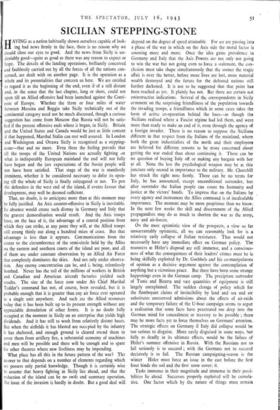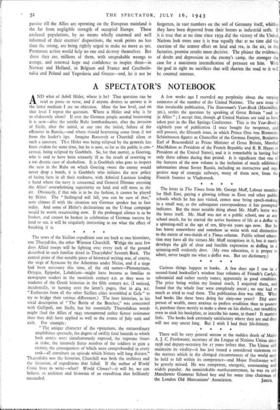SICILIAN STEPPING-STONE
HAVING as a nation habitually shown ourselves capable of look- ing bad news firmly in the face, there is no reason why we should close our eyes to good. And the news from Sicily is un- deniably good—quite as good as there was any reason to expect or hope. The details of the landing operations, brilliantly conceived and faultlessly carried out by all the forces of all the nations con- cerned, are dealt with on another page. It is the operation as a whole and its potentialities that concern us here. We are entitled to regard it as the beginning of- the end, even if-of a still distant end, in the sense that the last chapter, long or short, could not open till an Allied offensive had been launched against the Conti- nent of Europe. Whether the three or four miles of water between Messina and Reggio take Sicily technically out of the continental category need not be much discussed, though a curious suggestion has come from Moscow that Russia will not be satis- fied if the present offensive ends where it began, in Sicily. Britain and the United States and Canada would be just as little content if that happened, Marshal Stalin can rest well assured. In London and Washington and Ottawa Sicily is recognised as a stepping- stone—that and no more. Even there the feeling prevails that till the troops of the United Nations are actually fighting on what is -indisputably European mainland the end will not fully have begun and the just expectations of the Soviet people will not have been satisfied. That stage of the war is manifestly imminent, whether it be considered necessary to defer its open- ing till the whole of Sicily is finally subjugated or not. To pen the defenders in the west end of the island, if events favour that development, may well be deemed sufficient.
That, no doubt, is to anticipate more than at this moment may be fully justified. An Axis counter-offensive in Sicily is inevitable. Its absence would create such dismay in Germany and Italy that the gravest demoralisation would result. And the Axis troops have, on the face of it, the advantage of a central position from which they can strike, at any point they will, at the Allied troops still strung thinly out along a hundred miles of coast. But that advantage is less .than it appears. Communications from the centre to the circumference of the semi-circle held by the Allies on the eastern and southern coasts of the island are poor, and all of them are under constant observation by an Allied Air Force that completely dominates the skies. And not only under observa- tion. Any enemy concentration can be, and is being, relentlessly bombed. Never has the toil of the millions of workers in British and Canadian and American aircraft factories yielded such results. The size of the force now under Air Chief Marshal Tedder's command has not, of course, been revealed, but it is probable enough that it is greater than any air force ever operated as a single unit anywhere. And such are the Allied resources today that it has been built up to its present strength without any appreciable denudation of other fronts. It is no doubt fully occupied at the moment in Sicily on an enterprise that yields high dividends. And it has still to work from relatively distant bases. But when the airfields it has blasted are occupied by the infantry it has sheltered, and enough ground is cleared round them to cover them from artillery fire, a substantial economy of machines and men will be possible and there will be enough and to spare for other theatres where new liveliness may be impending.
What place has all this in the future pattern of the war? The answer to that depends on a number of elements regarding which we possess only partial knowledge. Though it is certainly wise to assume that heavy fighting in Sicily lies ahead, and that the reduction of the island can be no swift and summary operation, the issue of the invasion is hardly in doubt. But a good deal will depend on the degree of speed attainable. For we are passing into a phase of the war in which on the Axis side the moral factor is counting more and more. Once the idea gains prevalence in Germany and Italy that the Axis Powers are not only not going to win the war but not going even to force a stalemate, the con- clusion must take shape simultaneously that the sooner the tragic affair is over the better, before more lives are lost, more material wealth destroyed and the future for the defeated nations still further darkened. It is not to be suggested that that point has been reached as yet. It plainly has not. But there are certain not uninstructive indications. Several of the correspondents in Sicily comment on the surprising friendliness of the population towards the invading troops, a friendliness which in some cases takes the form of active co-operation behind the lines—as though the - Sicilians realised where a Fascist regime had led them, and were more than ready to make an end of it, even through the agency of a foreign invader. There is no reason to suppose the Sicilians different in that respect from the Italians of the mainland, where both the great industrialists of the north and their employees are believed for different reasons to be more concerned about getting the war ended than about continuing it. There can be no question of buying Italy off or making any bargain with her at all. None the less the psychological weapon may be at this juncture only second in importance to the military. Mr. Churchill has struck the right note firmly. There can be no terms for Italy, he has announced, except unconditional surrender, but after surrender the Italian people can count on humanity and justice at the victors' hands. To impress that on the Italians by every agency and instrument the Allies command is of incalculable importance. The moment may be more propitious than we know. In the next few weeks the skill and discernment of the Allied propagandists may do as much to shorten the war as the army, navy and air-forces.
On the most optimistic view of the prospects, a view so far unwarrantably optimistic, all we can reasonably look for is a relatively early collapse of Italian resistance. That would not necessarily have any immediate effect on German policy. The resources at Hitler's disposal are still immense, and a conscious- ness of what the consequences of their leaders' crimes must be is being skilfully exploited by Dr. Goebbels and his co-manipulators of opinion as a decisive argument against the contemplation of anything but a victorious peace. But there have been some strange happenings even in the German camp. The precipitate surrender of Tunis and Bizerta and vast quantities of equipment is still largely unexplained. The sudden change of policy which for the flamboyant claims of invincibility by land and sea and air substitutes unreserved admissions about the effects of air-raids and the temporary failure of the U-boat campaign seems to argue a realisation that some facts have penetrated too deep into the German mind for concealment or travesty to be possible ; there may be more facts yet to force themselves on Germans' attention. The strategic effects on Germany if Italy did collapse would be too serious to disguise. More easily disguised in some ways, but fully as deadly in its ultimate effects, would be the failure of Hitler's summer offensive in Russia. With the Russians not to fail seriously is to succeed ; with the Germans not to succeed decisively is to fail. The Russian campaigning-season is the winter Hitler must force an issue in the east before the first frost binds the soil and the first snow covers it.
Tasks immense in their magnitude and immense in their possi- bilities lie ahead. Successes properly exploited will be cumula- tive. One factor which by the nature of things must remain passive till the Allies are operating on the European mainland is the far from negligible strength of occupied Europe. Those enslaved populations, by no means wholly unarmed and well informed of their enemies' dispositions, the weak points no less than the strong, are being rightly urged to make no move as yet. Premature action would help no one and destroy themselves. But there they are, millions of them, with unspeakable wrongs to avenge, and renewed hope and confidence to inspire them—in Norway and Holland, in Belgium and France and Czechoslo- vakia and Poland and Yugoslavia and Greece—and, let it not be forgotten, in vast numbers on the soil of Germany itself, whither they have been deported from their homes as industrial serfs. If it is true that at no time since 1939 did the victory of the United Nations look more sure it is true equally that at no time did the exertion of the utmost effort on land and sea, in the air, in the factories, promise results more decisive. The plainer the evidences of doubt and depression in the enemy's camp, the stronger the case for a maximum intensification of pressure on him. With the goal in sight no sacrifices that will shorten the road to it will be counted onerous.



























 Previous page
Previous page